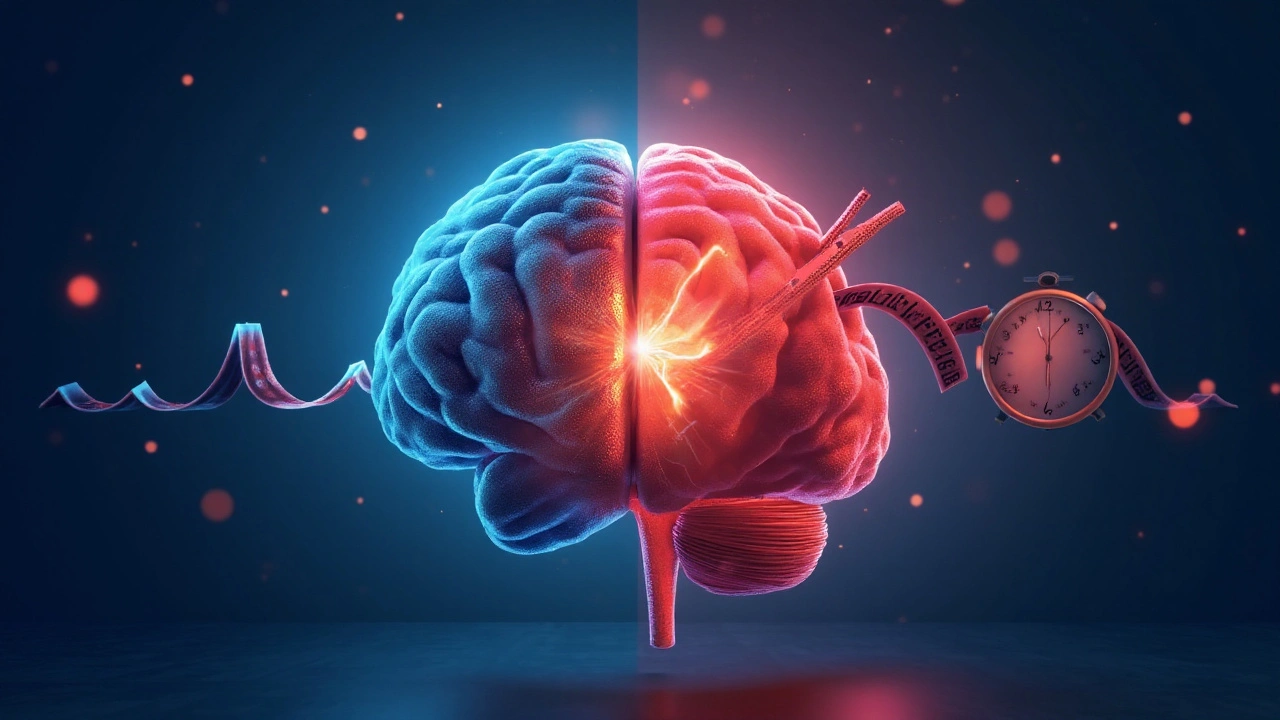Some people still think of bipolar disorder as just an emotional roller coaster. The reality? Your body pays a heavy price too, and not enough folks really talk about that. While mood swings run the show, the knock-on effects on physical health are just as real—and maybe even more dangerous in the long run. If you ignore these, you miss half the picture and most of your chance for a better life. Want the details regular doctors and Google searches skip? Let’s break it down for real.
How Bipolar Disorder Rewires the Body
Stressed out and worn down—that’s a feeling people with bipolar disorder know too well. The condition doesn’t stay in your head; it runs riot through your whole system. All those swings between mania and depression put your body into a constant state of emergency. Your heart rate, blood pressure, hormones—they all get jerked around. The amped-up energy of mania brings restless nights, overexertion, reckless behaviors. Crash into depression, and everything slows, including your ability to move, fight off germs, or even digest food properly.
It’s not random, either. Real science backs it up. Hospital records and large health surveys show people with bipolar disorder face way more physical health challenges than the average person. Blood sugar goes haywire. Immune systems get weaker. There’s even a higher risk for inflammatory diseases. That’s why, if you live with bipolar disorder or support someone who does, you owe it to yourself to look beyond moods and pay attention to these invisible struggles happening under the skin.
One study from 2021 out of the University of Cape Town sums it up: "Bipolar disorder should be considered a multisystem disorder, requiring healthcare that integrates both mental and physical well-being."
Bipolar disorder doesn’t end at the brain. It bleeds into the arteries, the gut, and the immune system—slowly reshaping the entire body’s chemistry.When I first read that, it haunted me. It means fixing your mind alone will never be enough.
Weight, Metabolism, and the Crushing Cycle
Let’s talk weight. There’s no sugarcoating it—bipolar disorder makes weight gain way more likely. Some of this comes from the illness itself. Depression saps your motivation to move or eat healthy. Mania leads to wild binges or days when meals get forgotten. Add meds to the mix (especially lithium, valproate, some antipsychotics), and your hunger signals can go haywire. Your metabolism slows without warning. Suddenly, you can’t outwalk or outsmart the scale—your clothes feel tighter, your joints ache, and your energy tanks even more.
Why does this matter? Carrying extra weight isn’t only about looks—it fuels diseases like diabetes, sleep apnea, and heart problems. Statistically, people with bipolar disorder are two to three times more likely to get type 2 diabetes. The weight gain creeps up quietly and is hard to reverse. I know people who thought they could just "try harder" to lose the kilos, but found the deck completely stacked against them. Gaining control here means tracking meds, checking thyroid levels (since some meds harm it), and getting real support—not just "eat less and move more."
If you’re struggling in this area, try not to beat yourself up. The cards are stacked, but there are ways to even the odds: small, consistent changes work better than big, punishing diets or sporadic gym sessions. Walking every day with Briony—even if she grumbles for half the walk—gives both of us a boost. Keeping food simple and tracking symptoms (what you ate, how you feel) often shows patterns your doctor might miss.

Heart Disease and the Silent Risks
Heart attacks, high blood pressure, strokes—you might think those are things to worry about "someday." For people with bipolar disorder, the risks come early. The numbers are scary: people diagnosed with bipolar are almost twice as likely to die from heart disease compared to the general public, and the risk starts decades sooner. You read that right—decades, not years.
It isn’t just the classic risk factors like smoking or lack of exercise (although those don’t help). Chronic stress from swinging moods cranks cortisol (the stress hormone) sky high. This triggers inflammation, damages blood vessels, and raises cholesterol. Medications like lithium, while life-saving, can put extra strain on kidneys and thyroid, piling on risk factors for the heart. You can be young and still be facing clogged arteries—no exaggeration.
Doctors in Durban, where I live, often tell me they see this "ageing from the inside out." In their clinics, blood pressure checks and cholesterol screening for bipolar patients start early, not late. Coping means taking physical health as seriously as mental health: regular checkups, moving your body, dropping cigarettes if you smoke, and staying on top of meds even when moods feel "fine." Nobody is immune. My friend Manny skipped his med reviews for two years and ended up in ICU after a minor heart attack at 34. If you have bipolar disorder, no health complaint is "just stress." Get it checked.
Sleep Problems: The Double-Edged Sword
If you ask psychiatrists what symptom really messes up bipolar disorder, most of them will mention sleep—or the lack of it. Trouble falling asleep, staying asleep, waking too early, or not feeling rested... sound familiar? For people with bipolar disorder, sleep problems are both a trigger and a symptom. Miss a night or two and mania might show up uninvited. Sleep too much during depression, and it drags you deeper into the fog.
Poor sleep does more than feed mental symptoms. Research out of Stellenbosch University found that bipolar patients who slept poorly had double the rates of chronic pain, migraines, even gastrointestinal problems. If you wake up exhausted, it affects your motivation to exercise, your ability to eat well, and your immune system’s ability to fight off bugs. Long-term, the body pays a steep price: blood sugar swings out of control, heart disease risk spikes, and emotional resilience drops off a cliff.
Dealing with this means making sleep a family priority. Blackout curtains, the same bedtime—even weekends—and routines that calm you down before bed all help. I keep electronics out of the bedroom, not because I’m some sleep guru, but because late-night doomscrolling always ends badly. Keeping Briony on a routine helps me, too—it’s surprisingly easier to follow healthy sleep when you do it together. If sleep is still impossible even after tweaks, ask your doc about sleep studies; sometimes undiagnosed sleep apnea or restless leg syndrome hides behind the usual "mood disorder" label.

Boosting Physical Health: Steps That Actually Work
Surviving with bipolar disorder isn’t just about controlling moods. You’ve got to defend your body, too. The game plan is multi-pronged, and no, it’s not all green juices and yoga (though those don’t hurt if you’re into them!). Start by teaming up with doctors who treat you as a person, not a diagnosis. Ask for full checkups at least once a year: blood sugar, thyroid, cholesterol, weight, blood pressure, liver and kidney function. Bring up weird symptoms, even if they seem small.
Diet matters, but complicated plans usually fail. Simple steps—more water, easy veggies, protein with every meal, less sugar—stick longer. Shopping lists and batch cooking on low-energy days (freeze leftovers!) keep you from reaching for junk food when you crash. Moving your body daily is crucial; walk the dog, cycle with your kids, take the stairs, don’t aim for perfect. Sleep hygiene isn’t optional. Set a cutoff for caffeine, build a wind-down routine, and treat bedtime as sacred, not negotiable.
Staying on meds is part of physical health, but note side effects. Some cause hunger (olanzapine, quetiapine), others muscle tremors (lithium). Report these pronto, not months later. Your doctor may adjust doses or change prescriptions. If you hit a slump (and you will), rope in friends, family, or local support groups. Durban has a growing community of lived-experience groups who offer accountability and swap real-life survival tips. If you spot early warning signs, act. Early help beats crisis support every time.
Tiny changes snowball. The first time Briony and I swapped chips for carrot sticks, we hated it, but a month in, the craving for junk faded. Celebrate small wins—you showed up to life, even if it was messy. "Managing bipolar disorder is like tending a garden. Everyday effort yields the strongest results," a local doctor here likes to say. He’s right. Consistency is more important than perfection. Your best tool? Refusing to get discouraged when setbacks come, because they will. Persistence, honesty with your team, and treating your body as part of your recovery—not an afterthought—makes all the difference.





alaa ismail
August 16, 2025 AT 07:04Man, I never thought about how bipolar messes with your gut and heart like that. I knew the mood swings were rough, but the body stuff? That’s wild. My cousin’s on lithium and just got diagnosed with prediabetes last year-no joke, it’s a whole system thing.
Shubham Pandey
August 16, 2025 AT 18:29Yeah but like… aren’t meds just making it worse?
Sandi Allen
August 18, 2025 AT 11:17Of course the system is rigged-pharma companies don’t want you to know that lifestyle changes beat pills… and yet, here we are, forced to take 5 meds just to sit still. They profit from your broken body, not your healing.
And don’t even get me started on how doctors ignore thyroid tests until you’re in cardiac arrest. It’s not negligence-it’s negligence with a paycheck.
I’ve seen people die from this. Not because they didn’t try… but because the system refuses to see the whole person. Your body isn’t a separate file-it’s the main document.
And if you think exercise fixes everything? Try walking when your limbs feel like concrete. Try eating greens when your brain screams for sugar. This isn’t willpower. It’s warfare.
And yes, I know the “eat less, move more” crowd thinks they’re helping. They’re not. They’re just scared to admit how broken the system is.
Stop blaming the patient. Start blaming the profit motive.
And if you’re still using the word “compliance”? You’re part of the problem.
My friend died at 37 from a heart attack. She was on quetiapine. Her doctor said, “It’s just weight gain.”
It wasn’t just weight gain. It was slow murder with a prescription pad.
And now they want to “educate” us? No. We need systemic change. Not pep talks.
ruiqing Jane
August 19, 2025 AT 23:39This post hit me so hard. I’ve been living with this for 12 years, and no one ever told me the weight gain wasn’t just “lazy.” It’s the meds, the cortisol, the metabolic shutdown-it’s biology, not failure.
I started tracking my meals and sleep in a notebook, just simple stuff: “ate protein, slept 5 hours, felt shaky.” After 3 months, I saw patterns my doctor missed. She adjusted my dose and we checked my thyroid. Game changer.
And yes, I still have bad days. But now I don’t hate myself for them. I just adjust. That’s all.
Consistency over perfection. I’m stealing that line.
Carolyn Woodard
August 20, 2025 AT 04:47The multisystem nature of bipolar disorder is increasingly validated by neuroimmunological research-particularly in the context of microglial activation and cytokine dysregulation. The HPA axis hyperactivity observed during manic episodes induces glucocorticoid resistance, which in turn potentiates systemic inflammation, contributing to insulin resistance, endothelial dysfunction, and accelerated atherosclerosis.
Moreover, pharmacological agents such as lithium and valproate modulate mitochondrial biogenesis via PGC-1α pathways, which may explain the metabolic phenotypes observed in long-term users.
What’s missing from most clinical discourse is the epigenetic component: chronic stress exposure in bipolar individuals alters DNA methylation patterns in genes regulating cortisol signaling and lipid metabolism, creating a self-reinforcing biological loop.
Integrative care models must therefore include not only psychiatric monitoring but also longitudinal metabolic profiling, inflammatory biomarkers, and sleep architecture analysis via polysomnography.
Otherwise, we’re treating symptoms while the architecture of disease remodels beneath us.
Zoe Bray
August 21, 2025 AT 15:28It is imperative that healthcare professionals adopt a biopsychosocial framework when managing individuals diagnosed with bipolar disorder. The conflation of mental health with physical health remains a critical gap in contemporary clinical practice.
Physiological parameters-including but not limited to serum glucose, lipid profile, thyroid-stimulating hormone, and renal function-must be monitored with the same rigor as mood scales.
Furthermore, the absence of standardized protocols for physical health screening in psychiatric outpatient settings constitutes a systemic failure that disproportionately impacts vulnerable populations.
Until multidisciplinary care teams-including endocrinologists, cardiologists, and nutritionists-are routinely integrated into bipolar treatment plans, mortality disparities will persist.
Education must extend beyond the patient to the provider.
Saket Modi
August 23, 2025 AT 01:36brooo why u always so serious 😩 i just wanna nap and eat chips
Chris Wallace
August 24, 2025 AT 10:19I’ve been thinking about this a lot lately, especially after reading that Cape Town study. It’s not just that the body suffers-it’s that the body becomes a mirror for the mind’s chaos. Every time I have a manic episode, my joints swell. Every depressive crash, my digestion shuts down. It’s not coincidence. It’s connection.
And the worst part? No one talks about how the stress of being sick all the time makes you sicker. You’re not just managing moods-you’re managing a body that’s been through a war you didn’t sign up for.
I started walking with my dog every morning, even if it was just to the end of the block. It didn’t fix everything. But it gave me a rhythm. A tiny anchor.
Maybe that’s enough.
Elizabeth Farrell
August 25, 2025 AT 17:58I want to say thank you for writing this. I’ve been trying to explain to my family that my fatigue isn’t laziness-it’s inflammation, it’s metabolic dysfunction, it’s the aftermath of sleep deprivation that’s been going on for years. They think I’m making excuses.
But this? This is the language I needed. I’m printing it out and handing it to my mom. No more guessing. No more shame.
And if you’re struggling with sleep-yes, blackout curtains help. So does a weighted blanket. And if your doctor says “just sleep better,” ask for a sleep study. Sleep apnea is hiding in plain sight for so many of us.
You’re not broken. You’re surviving.
Chelsea Moore
August 26, 2025 AT 04:20THIS IS WHY WE CAN’T HAVE NICE THINGS!!!
Everyone’s just like, “oh it’s just bipolar,” like it’s a personality trait!!
NO. IT’S A SYSTEMIC FAILURE. IT’S PHARMA. IT’S THE MEDICAL INDUSTRY. IT’S THE FACT THAT NO ONE WANTS TO PAY FOR LONG-TERM CARE!!
AND DON’T EVEN GET ME STARTED ON HOW THEY MAKE YOU FEEL GUILTY FOR GAINING WEIGHT WHEN YOUR MEDS ARE MAKING YOU HUNGRY LIKE A WOLF!!
WHY IS NO ONE IN CONGRESS DOING ANYTHING???
I’M CRYING. I’M SO TIRED.
John Biesecker
August 27, 2025 AT 15:30man i read this and just felt seen 😔 i used to think i was weak for needing to nap after eating… turns out my body’s just trying to survive the meds and the mood swings
also briony sounds like a good dog 🐶
Genesis Rubi
August 28, 2025 AT 05:02Ugh i hate how americans turn everything into a trauma narrative. In my country we just take our meds and get on with it. No one’s got time for your “body is a battlefield” poetry.
Also why is everyone always talking about Durban? Is this some kind of cult?
Doug Hawk
August 30, 2025 AT 03:02Interesting how the article conflates correlation with causation-just because people with bipolar have higher rates of heart disease doesn’t mean the disorder causes it. Lifestyle factors, socioeconomic status, access to care-all these are confounders. But no one wants to talk about that, do they?
And the anecdotal evidence? Manny’s heart attack at 34? That’s one data point. Not a trend.
Still… I get why people need to feel validated. But let’s not confuse emotional truth with epidemiological truth.
John Morrow
August 31, 2025 AT 10:09Let’s be brutally honest: the entire narrative around bipolar and physical health is a performative compassion industry. The real issue? The system doesn’t care if you live or die-it cares about billing codes and insurance reimbursements.
Doctors don’t have time to review your lipid panel. They’re seeing 30 patients an hour. And the ones who do? They’re burned out. So we get feel-good blog posts like this one-emotional, poetic, vaguely informative-but zero structural accountability.
It’s therapeutic theater. It makes the reader feel heard, while the machine keeps grinding.
What’s missing? Policy. Funding. Mandated screenings. Not another story about walking with Briony.
Victoria Graci
September 1, 2025 AT 16:41I’ve always thought of bipolar as a symphony-some parts loud, some parts silent, but all of it connected. The heart doesn’t beat in isolation from the mind. The gut doesn’t digest without the brain whispering, “eat,” or “don’t touch food.”
It’s not a disease of one organ. It’s a disruption of harmony.
And maybe that’s why “treatment” feels so impossible sometimes. We’re trying to fix a single instrument while the whole orchestra is out of tune.
Maybe we need to stop chasing cures… and start learning how to listen.
Saravanan Sathyanandha
September 3, 2025 AT 10:49In India, we don’t have the luxury of discussing this openly. Many families still believe bipolar is “too much thinking.” But I’ve seen cousins lose weight during mania, then gain 40 kilos on olanzapine. No one talks about it.
My sister took lithium and developed tremors. We didn’t know it was a side effect-thought it was “nervousness.” She stopped taking it. Then she crashed.
Thank you for saying this. Maybe now someone will listen.
Fern Marder
September 3, 2025 AT 11:01you’re doing great 💪❤️ even if today was just getting out of bed, that’s a win. you’re not behind. you’re not broken. you’re here. and that matters.
Chris Wallace
September 4, 2025 AT 03:34That comment about the orchestra… I never thought of it that way. It’s like the body’s trying to play a song it doesn’t know the chords to. And we’re all just guessing which note comes next.
But maybe that’s the point-not to fix every note, but to learn how to listen to the silence between them.